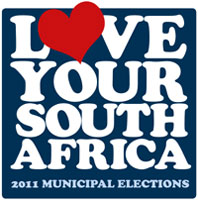
Top stories





Energy & MiningGlencore's Astron Energy gears up with new tanker amidst Sars dispute
Wendell Roelf 9 hours

More news




















Logistics & Transport
Uganda plans new rail link to Tanzania for mineral export boost








While advertising political agendas is not exactly new, the puritans have often found it a little distasteful, even mercenary. What Obama proved, with his upbeat message and clever use of modern media, was that politics could be for the masses and advertising was the way to make it so.
Across the Atlantic here in South Africa, selling politics to the masses has fast been becoming a reality as the IEC (Independent Electoral Committee) municipal elections approach.
Your right to have a view
While Obama was selling an ideal, his ideal, the IEC is not selling a particular view or opinion, but rather your right to have one. This was the challenge that faced us [TBWA\Hunt\Lascaris] when we were tasked with executing the campaign to sell the municipal elections to the public.
The brief was simple - get people to vote. The challenges have been a little more complex - and unique.
First, the IEC had to be totally impartial and so it couldn't talk about the issues. The minute you start bringing up service delivery, for example, you're implying an opinion. So my first question was: how do we spur people to action without having a specific cause?
Secondly, there's the apathy of youth. Young people just don't see voting as important. Perhaps they don't feel they can make a difference or maybe they can't be bothered. Either way, we had to get them to give a damn.
All about communities
The fact that this is a municipal election gave us a lot of leverage. The election is about communities and the issues that affect people on a daily basis.
Ironically, because they are the smaller issues, they become more important to individuals. The questions about who gets put in charge of your garbage disposal, your power and water, the municipal road maintenance and so on are important because they impact how you can function and carry on with your life.
Joe Public isn't about lofty ideals; he's about being able to get to work, turn on a tap and being able to care for his family and community. The municipality is where he can make a difference by voting.
It was clear that we could talk about communities. So we chose to humanise the country with the phrase "Love your South Africa". The word 'your' was important here, because SA is perceived differently depending on whom you're talking to. A Sowetan South African is a world apart from a Capetonian South African. But, when individuals vote about issues they care about, in their home towns, it forms the glue that helps create communities.
360 degree approach
The campaign has taken a 360 degree approach, targeting South Africans at every level. Another challenge faced has been spreading this message equally across the board, from LSM 1 to LSM 10. Media choices have played a critical role, with everything from billboards to TV to radio to social media. The message, however, has stayed the same - show that you love your South Africa by voting.
Celebrities have been invited to give 'shout-outs' on radio to their communities. They've been featured in TV ads talking about 'their South Africa', encouraging people to get involved by voting. And, of course, billboards have been erected countrywide.
Unlike so many political campaigns that seek to win people over by highlighting what is wrong with the status quo, this is an emotional campaign, leveraging the innate pride that people have in the places they live in, and their country.
It reminds us that we are part of something bigger and that we have a responsibility to ourselves and to our communities to vote. Time will tell if this more positive approach leads people to the ballot box but, as the campaign reminds us, "If you vote, it's because you feel strongly about something." And few feel more strongly about anything than their homes.
